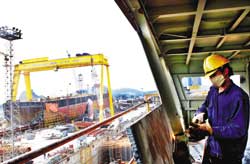Hand tightens grip over state groups
The state is tightening its control over state-owned groups. The Ministry of Planning and Investment (MPI) has submitted a draft decree to Prime Minister Nguyen Tan Dung in order to strengthen state ownership rights and improve investment supervision outside core businesses.
 |
If groups invest in risky sectors like securities and banking or in sectors that may influence the core business, they must have the prime minister’s approval. The draft also suggests that new groups have legal capital of at least $411 million.
Vietnam has a number of state-owned groups including Vietnam Shipbuilding Industry Group, Vietnam National Oil and Gas Group (PetroVietnam), Electricity of Vietnam, Bao Viet Group, Vietnam National Coal-Mineral Industries Group, Vietnam National Textile and Garment Group and Vietnam Rubber Group.
The groups were experimentally established to steer important economic sectors toward ensuring economic security for the country.
In the last two years, those groups have expanded their investments outside their core businesses, especially in financial and property sectors, and economists and policy makers have said these investments contributed to the country’s inflation rate this year. Recently, Dung asked those groups to focus on core business instead of investing in financial and property sectors.
“The relaxation of state management in the past years has allowed those groups to expand their investment outside core businesses. But, they were established to control key economic sectors in the country,” said Nguyen Dinh Cung, head of the Department for Macroeconomic Policy under the Central Institute of Economic Management.
The draft defines the supervisory and management responsibilities of ministries. For example, the MPI supervises parent companies in establishing subsidiaries and contributing capital to other companies operating in risky areas.
The Ministry of Home Affairs supervises and appraises the capability of group leaders. The Ministry of Finance supervises and appraises financial and business activities of the parent company and the group’s investments in major fields of business and related areas.
However, PetroVietnam chairman Dinh La Thang said the decree would control and tighten activities of groups, instead of creating a legal corridor for the development of this model.
“The most important thing for businesses is economic effectiveness. We know that we have to focus on the major fields of business, but if investment outside core businesses is effective, why should we be forbidden to invest in them?” said Le Xuan Ve, chief of PetroVietnam’s Personnel Department.
Vice MPI Minister Truong Van Doan said the decree was not attempting to control the autonomy of groups.
“The decree only ensures groups follow regulations regarding ownership and representative ownership of the state,” he said.
Speaking at the meeting with leaders of state-owned groups and corporations, Dung said those groups were not forbidden to invest outside core business but should be controlled. He also stressed that those groups had to fulfill their business missions before investing outside and all outside investment must serve the core business.
What the stars mean:
★ Poor ★ ★ Promising ★★★ Good ★★★★ Very good ★★★★★ Exceptional
 Tag:
Tag:
Related Contents
Latest News
More News
- Hermes joins Long Thanh cargo terminal development (February 04, 2026 | 15:59)
- SCG enhances production and distribution in Vietnam (February 04, 2026 | 08:00)
- UNIVACCO strengthens Asia expansion with Vietnam facility (February 03, 2026 | 08:00)
- Cai Mep Ha Port project wins approval with $1.95bn investment (February 02, 2026 | 16:17)
- Repositioning Vietnam in Asia’s manufacturing race (February 02, 2026 | 16:00)
- Manufacturing growth remains solid in early 2026 (February 02, 2026 | 15:28)
- Navigating venture capital trends across the continent (February 02, 2026 | 14:00)
- Motivations to achieve high growth (February 02, 2026 | 11:00)
- Capacity and regulations among British areas of expertise in IFCs (February 02, 2026 | 09:09)
- Transition underway in German investment across Vietnam (February 02, 2026 | 08:00)






















 Mobile Version
Mobile Version